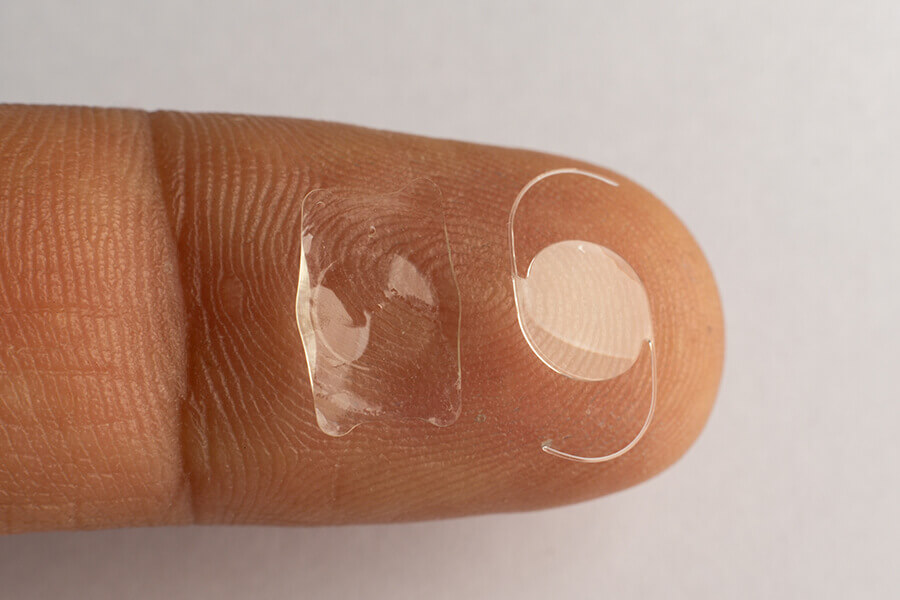Advanced Technology Implants
A new vision lifestyle alternative for people in Northwest Indiana that might be approaching cataract surgery. Imagine having cataract surgery and being able to see at all distances without glasses? This is not the same cataract surgery that your grandparents had. Read more to see how we have helped so many people see better after cataract surgery.
Take our cataract self test to familiarize yourself with the associated questions.
If you are nearing the age for cataract surgery and want a reliable vision correction solution advanced technology lens implants might be a good idea. Prior to having cataract surgery, you will need to determine what type of lens implants makes the most sense for your life. Having a thorough consultation with the cataract surgeons at Helix Eye Care will ensure that you are properly educated before making this important decision.
Things to think about before cataract surgery
- Should I consider laser cataract surgery instead of traditional cataract surgery?
- What type of lens implant would be best for me after cataract surgery, a monofocal, astigmatism correcting or full focus multifocal lens implant?
This Choice Will Last A Lifetime

You will be using your new eyesight every waking moment for the rest of your life. Please take as much time as needed to consult with us as well as your family. Our surgeons, technicians and coordinators are available to help you make the best decision.
Selecting the right type of cataract surgery and implant for your eye is very important for your visual outcome. Special eye measurements will provide the data necessary for your surgeon to determine the implant power. Our cataract surgeons will personally meet with you to discuss what lens would work best for your eye. Depending on eye history and current medical condition we may have a unique lens suggestion.
Several years ago, patients only had the option of monofocal lens implants, which enabled vision at one distance only. Now these new advanced technology lens implants and precise measurement combinations can offer a wide spectrum of vision including near, intermediate and far vision. Advanced technology lens implants have been helping people over 40 and cataract aged patients since they became viable option. Could you possibly imagine being able to read the newspaper, drive at night or play golf without the use of glasses. At Helix Eye Care enhanced, elite vision after cataract surgery is a possibility. As with any surgery, there are risks involved, and a certain level of reasonable expectations should be discussed with your cataract surgeon.
Advanced Technology Lens Implants
Astigmatism Correcting Lens Implants: Toric IOL
Astigmatism correcting lens implants are also known as toric lens implants. A toric lens implant is not the only method of astigmatism correction so consult a doctor about the current treatment possibilities. Astigmatism can be corrected with glasses, contact lenses, corneal relaxing incisions, laser vision correction, and special implant lenses. If a you have astigmatism and have aspirations to be glasses free after surgery the toric lens implant is a good option. Toric IOL technology uses biocompatible materials that have been successfully used in contact lenses and proven safe for the eye. There is an additional cost for this lens implant. We have used many types of toric lens implants but right now we are excited about the Tecnis Eyehance Toric II IOL. These particular IOLs provide excellent distance vision, while at the same providing astigmatism correction all at the time of cataract surgery.
If you are seeking astigmatism correction in Indiana, please feel free to contact us to schedule an eye exam.
Light Adjustable Lens (by RxSight)
The Light Adjustable Lens is the only adjustable intraocular lens (IOL) available that allows optimization of your vision AFTER lens implantation and healing. The Light Adjustable Lens is made of a special photosensitive material that can be adjusted in response to ultraviolet (UV) light. This optimization is done by your eye doctor in the weeks following lens implantation through a series of non-invasive light treatments that take only a few minutes each. You will have the unique ability to adjust and preview your vision until it meets your personal desires and lifestyle requirements. The Light Adjustable Lens delivers superior vision outcomes that non-adjustable IOLs cannot match.
What are multifocal lens implants?

Multifocal lens implants are intraocular lenses (IOLs) that are used to correct vision problems in people who have cataracts or other conditions that affect the natural lens of the eye. These IOLs contain multiple prescriptions for different distances, similar to multifocal eyeglass lenses. They are designed to help people see clearly at a range of distances after cataract surgery or other types of lens replacement surgery.
There are several types of multifocal lens implants available, including refractive multifocal IOLs and diffractive multifocal IOLs. Refractive multifocal IOLs use multiple refractive powers to help the eye focus on objects at different distances. Diffractive multifocal IOLs use a series of concentric rings that diffract light in different directions to focus on objects at different distances.
Multifocal lens implants can be an effective way to improve vision after cataract surgery or other types of lens replacement surgery, but they may not be suitable for everyone. It is important to discuss the potential benefits and risks with an eye care professional before deciding whether multifocal lens implants are the right option for you.
The PanOptix lens
The PanOptix lens is the first of its kind in the U.S. — it is a trifocal, which means it can restore your normal vision at full range. To understand the advantages of the PanOptix trifocal lens, however, it’s important to differentiate it from monofocal lenses because these only provide vision at one distance. The PanOptix is a true Multifocal experience.
The PanOptix lens, is another option for patients looking to be free from prescription glasses after cataract surgery, as well as to be as independent as possible from reading glasses. The PanOptix lens has several concentric lens sections that have alternating refractive powers, allowing you to see clearly from afar, at an intermediate distance, and up close with each eye. It is indeed the perfect choice if you want to be as independent as possible from prescription and reading glasses.
The AcrySof® IQ Vivity™ IOL
The AcrySof® IQ Vivity™ IOL is the first and only intraocular lens that provides a non-diffractive, extended depth of focus. Having an extended depth of focus means that the lens enables high-quality vision at far and intermediate distances and functional vision when you’re looking at things that are up close.
